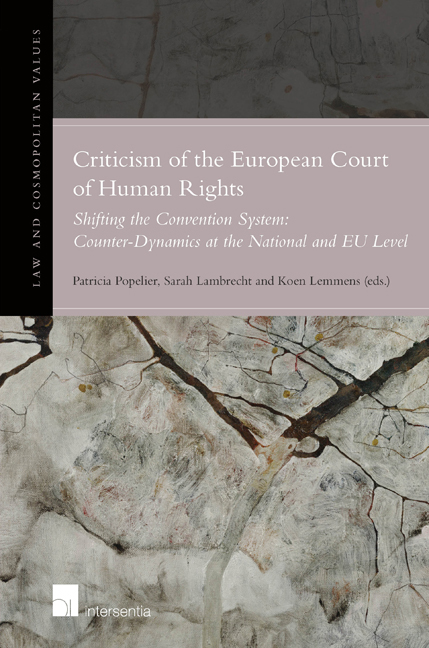 Criticism of the European Court of Human Rights
Criticism of the European Court of Human Rights from PART II - SPARSE CRITICISM
Published online by Cambridge University Press: 13 December 2017
CRITICISM OF THE EUROPEAN COURT OF HUMAN RIGHTS
THE CONVENTION IN AUSTRIAN CONSTITUTIONAL DESIGN
Among the 47 Member States of the Council of Europe, Austria has given a unique status to the ECHR as well as most of its Additional Protocols, since it is the only member state that incorporated the Convention into its federal constitutional law. In Austria, the Convention thus has been an established component of the “supreme law of the land” for a long time. At the beginning, this had not been uncontroversial, though. When Austria ratified the ECHR in 1958, Parliament gave its approval without particularly mentioning that the ECHR would receive the status of a federal constitutional amendment. Since the Constitutional Court did not at first recognise the federal constitutional status of the ECHR, a federal constitutional amendment was passed in 1964 which retroactively confirmed the federal constitutional status of the ECHR (as well as Protocol No 1) and specified Article 50 Bundes-Verfassungsgesetz (B-VG) to the effect that international treaties could henceforth be transformed as a federal constitutional amendment; in this case the respective treaty required the same qualified parliamentary approval as a federal constitutional amendment and the approval needed to state explicitly that the Federal Constitution was amended.
Austria has since ratified additional Protocols Nos 1–14 (except No 12) and transformed these treaties as parts of Austrian federal constitutional law. The previous instruments of ratification included four reservations and one declaration, part of which have meanwhile been declared invalid. Protocols No 15 and 16 have not yet been ratified, even though Protocol No 15 was signed by the Austrian Federal President on 25 June 2013. However, future ratifications will be different from those of the other Protocols, since, due to a federal constitutional amendment in 2008, Article 50 B-VG does no longer allow the ratification of international treaties that amend the Federal Constitution, except for those treaties that concern the treaties underlying the EU. However, it is not excluded that future Protocols to the ECHR could be transformed into federal constitutional law, if this were authorised by a specific federal constitutional amendment, as a lex specialis to Article 50 B-VG.
To save this book to your Kindle, first ensure [email protected] is added to your Approved Personal Document E-mail List under your Personal Document Settings on the Manage Your Content and Devices page of your Amazon account. Then enter the ‘name’ part of your Kindle email address below. Find out more about saving to your Kindle.
Note you can select to save to either the @free.kindle.com or @kindle.com variations. ‘@free.kindle.com’ emails are free but can only be saved to your device when it is connected to wi-fi. ‘@kindle.com’ emails can be delivered even when you are not connected to wi-fi, but note that service fees apply.
Find out more about the Kindle Personal Document Service.
To save content items to your account, please confirm that you agree to abide by our usage policies. If this is the first time you use this feature, you will be asked to authorise Cambridge Core to connect with your account. Find out more about saving content to Dropbox.
To save content items to your account, please confirm that you agree to abide by our usage policies. If this is the first time you use this feature, you will be asked to authorise Cambridge Core to connect with your account. Find out more about saving content to Google Drive.